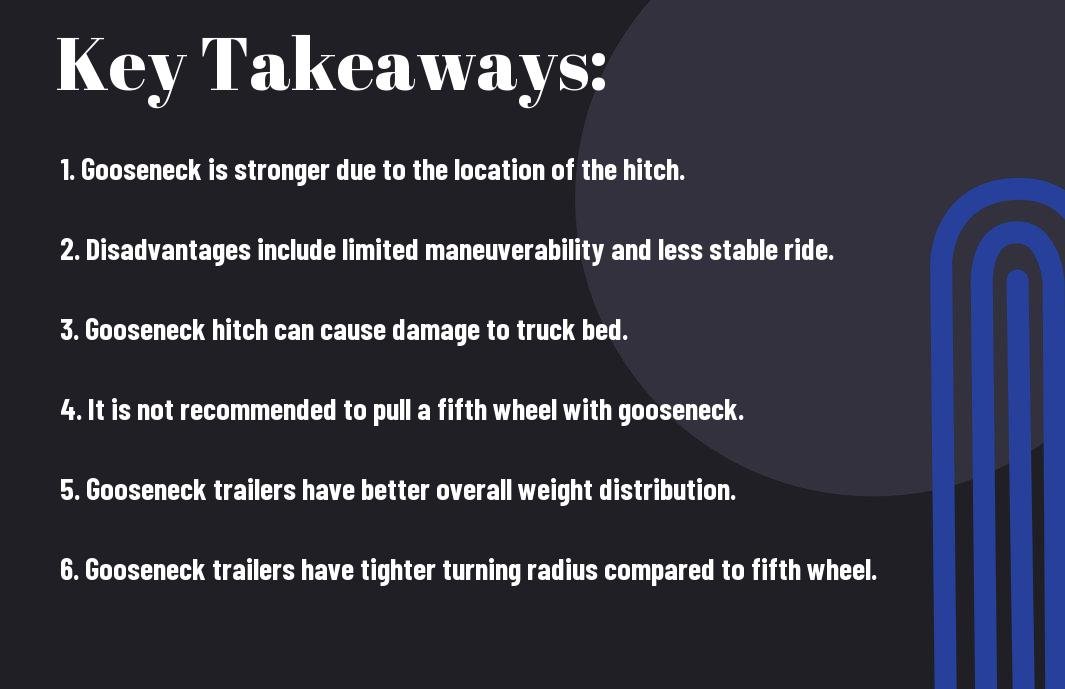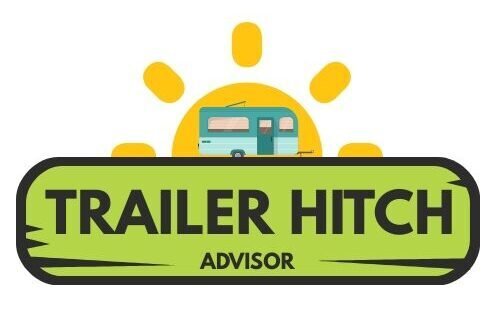Do you know why a gooseneck trailer is stronger than a 5th wheel? In the world of towing, understanding the key differences between these two hitch types is crucial for making an informed decision. While a gooseneck hitch offers superior strength and stability, there are also disadvantages to consider when using this type of trailer. In this blog post, we will explore the reasons why a gooseneck is stronger than a 5th wheel, the potential drawbacks of a gooseneck trailer, and whether you can pull a 5th wheel with a gooseneck hitch.
Key Takeaways:
- Gooseneck is stronger: Gooseneck trailers are often considered stronger than 5th wheel trailers due to the placement of the hitch, which helps distribute weight more evenly.
- Disadvantages of a gooseneck: One disadvantage of a gooseneck trailer is that it requires a pickup truck with a specialized hitch and may not be suitable for all types of vehicles.
- Pulling a fifth wheel with a gooseneck hitch: While it is technically possible to pull a fifth wheel with a gooseneck hitch, it is not recommended as it can affect the stability and safety of the trailer.

Strengths of Gooseneck Hitches
Obviously, gooseneck hitches have numerous advantages that make them a popular choice for towing heavy loads. From structural benefits to towing and maneuvering advantages, and safety and stability considerations, a gooseneck hitch offers several reasons why it is stronger than a 5th wheel.
Structural Benefits
The main structural benefit of a gooseneck hitch is its design, which allows it to distribute weight more evenly between the front and rear axles of the towing vehicle. This even weight distribution reduces strain on the rear axle and tires, as well as the frame of the towing vehicle. Additionally, the gooseneck hitch is mounted in the bed of the truck, providing a more stable connection point for the trailer, compared to a 5th wheel, which is mounted above the bed.
Towing and Maneuvering Advantages
When it comes to towing heavy loads, a gooseneck hitch provides better stability and control. The pivot point of the gooseneck is located closer to the rear axle of the towing vehicle, allowing for tighter turns and better maneuverability. This means you can navigate through tight spaces and around corners more easily with a gooseneck hitch than with a 5th wheel.
Safety and Stability Considerations
One of the most important advantages of a gooseneck hitch is its enhanced safety and stability. The gooseneck hitch offers a more stable towing experience, reducing the chances of sway and making it easier to maintain control of the trailer, especially at higher speeds. This increased stability can be crucial when towing heavy loads, as it minimizes the risk of accidents due to trailer sway or loss of control.
Disadvantages of Gooseneck Trailers
After discussing the strength and towing capabilities of gooseneck trailers, it is important to also consider the potential disadvantages of choosing this type of hitch for your trailer. While there are many advantages to using a gooseneck hitch, it is important to be aware of the drawbacks so you can make an informed decision.
Compatibility and Convenience Issues
When it comes to gooseneck trailers, one of the main disadvantages is the compatibility and convenience issues that may arise. Unlike fifth wheel hitches, gooseneck hitches require a specific type of truck with a specific type of hitch installed. This limits your options when it comes to using different vehicles to tow your trailer. Additionally, maneuvering a gooseneck trailer can be more challenging in tight spaces compared to a fifth wheel, which offers greater visibility and ease of turning. If you frequently find yourself in situations where you need to back up or maneuver your trailer in tight spaces, this may pose a significant inconvenience for you.
Cost and Installation Aspects
Another potential downside to gooseneck trailers is the cost and installation aspects. While gooseneck hitches are known for their strength and stability, they typically require professional installation, which can be more costly and time-consuming compared to fifth wheel hitches. Additionally, the initial cost of purchasing a gooseneck hitch and converting your trailer to accommodate this type of hitch may be higher than opting for a fifth wheel setup. This can add to the overall cost of owning and maintaining a goosnech trailer, something you should consider when making your decision.
The Fifth Wheel Hitch: Pros and Cons
Not all trailers are created equal, and the fifth wheel hitch is no exception. It comes with its own set of advantages and disadvantages that you need to be aware of before making a decision.
| Pros | Cons |
| Easier to maneuver | Limited storage space in truck bed |
| Provides a more stable and comfortable ride | Installation can be more complex |
| Offers larger living space in the trailer | Higher cost of installation and maintenance |
| Allows for better turning radius | More challenging to hitch and unhitch |
| Can tow heavier loads | Requires a heavier duty truck for towing |
Design Characteristics
When it comes to the design of a fifth wheel hitch, you can expect a more stable and comfortable ride compared to other types of hitches. This is because the hitch is mounted in the middle of the truck bed, allowing for a more even distribution of weight and better handling on the road. However, the installation of a fifth wheel hitch can be more complex and may require professional help. Additionally, the limited storage space in the truck bed may be a drawback for some users.
User-Friendly Features
One of the main advantages of a fifth wheel hitch is its ability to provide larger living space in the trailer. This can be a major selling point for people who spend extended periods on the road. Additionally, the hitch allows for a better turning radius, making it easier to navigate through tight spots. On the downside, hitching and unhitching a fifth wheel can be more challenging compared to other types of hitches. It also requires a heavier duty truck for towing, which can be an added expense for some users.
Interchangeability between Hitches
Now, let’s talk about the interchangeability between gooseneck and fifth wheel hitches. One of the common questions that comes up when discussing gooseneck and fifth wheel trailers is whether you can pull a fifth wheel with a gooseneck hitch, or vice versa. The short answer is yes, it is possible. However, you will need to use an adapter to make the connection between the two types of hitches. Keep in mind that while an adapter may allow you to pull a fifth wheel with a gooseneck hitch, it may not be the most ideal or safe setup.
Using a Gooseneck to Pull a Fifth Wheel
Using a gooseneck hitch to pull a fifth wheel trailer is possible with the use of an adapter. This setup can be convenient if you already have a gooseneck hitch installed in your truck and need to tow a fifth wheel trailer. However, it’s important to note that this setup can have some drawbacks. The main disadvantage is that using an adapter to pull a fifth wheel with a gooseneck hitch can put additional stress on both the hitch and the trailer. This can increase the risk of structural damage and potentially compromise safety.
Considerations and Precautions
When considering using a gooseneck hitch to pull a fifth wheel trailer, there are a few important factors to keep in mind. First and foremost, you should always check with the manufacturer of your trailer and hitch to ensure that using an adapter is a safe and approved method for your specific setup. Additionally, it’s crucial to carefully consider the weight and dimensions of your trailer, as well as the towing capacity of your truck and hitch. It’s essential to take precautions to avoid overloading your hitch and compromising the safety and integrity of your setup.
Conclusion
Following this discussion, you now understand why a gooseneck trailer is stronger than a 5th wheel. The gooseneck design places the weight directly over the rear axle of the towing vehicle, providing more stability and better weight distribution. However, there are disadvantages to using a gooseneck trailer, such as limited maneuverability and the potential for a rougher ride. Additionally, it is not recommended to pull a fifth wheel with a gooseneck hitch, as it can lead to unsafe towing conditions and potential damage to the trailer and hitch. It’s important to consider the specific needs of your towing situation and choose the trailer and hitch that best suits your requirements.
FAQ About Gooseneck Trailers and Hitches
Q: Why is a gooseneck stronger than a fifth wheel?
A: A gooseneck hitch attaches to the bed of the truck, providing a solid and stable connection point. This setup distributes the weight more evenly across the bed of the truck, making it stronger than a fifth wheel hitch which attaches to the frame of the truck.
Q: What are the disadvantages of a gooseneck trailer?
A: One disadvantage of a gooseneck trailer is that it requires a larger, heavier duty truck to tow it and may have a higher initial cost compared to other trailers. Additionally, the hitch location in the truck bed can limit cargo space and towing capacity for certain applications.
Q: Can you pull a fifth wheel with a gooseneck hitch?
A: While it is possible to tow a fifth wheel trailer with a gooseneck adapter, it is not recommended due to safety concerns. Using a gooseneck adapter can create additional stress on the trailer frame and could potentially void the trailer’s warranty.
Q: What type of truck is best for towing a gooseneck trailer?
A: Generally, a heavy-duty truck such as a Ford F-250 or Ram 2500 with a strong diesel engine is best suited for towing a gooseneck trailer. These trucks have the necessary towing capacity and stability to safely tow a gooseneck trailer.
Q: What are the benefits of using a gooseneck trailer?
A: Gooseneck trailers offer several advantages, including a tighter turning radius, better weight distribution, and increased stability while towing. They are also easier to hitch and unhitch compared to other trailer types, making them popular for hauling heavy loads such as livestock or construction equipment.
